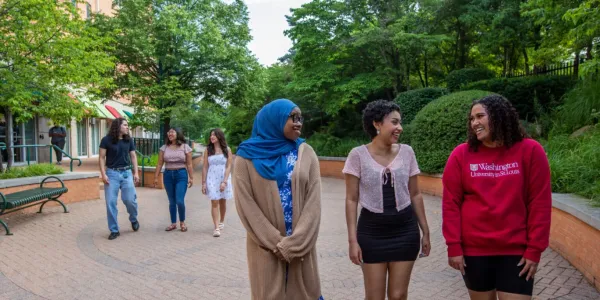During his installation ceremony on April 24, William J. Maxwell, the Fannie Hurst Professor of Creative Literature, delivered an address titled “Fannie Hurst, or the Drama of the White African Americanist.”

William J. Maxwell was installed as the Fannie Hurst Professor of Creative Literature on April 24. The program included a welcome from Feng Sheng Hu, the Richard G. Engelsmann Dean of Arts & Sciences and Lucille P. Markey Distinguished Professor; remarks from Abram Van Engen, chair of the Department of English and the Stanley Elkin Professor in the Humanities, and Gerald Early, the Merle Kling Professor of Modern Letters; and the installation and medallion presentation by Dean Hu.
In his remarks, Maxwell highlighted the impact of writer and activist Fannie Hurst, a WashU alumna whose complex legacy includes novels, plays, short stories, and a commitment to social justice for women and Black Americans. Her work and generosity also had a major impact on the university, Maxwell said.
“At WashU, Fannie Hurst is in all of us, having formed many of us, notably those who have taught, studied, or read in the vicinity of the WashU English department,” he said.
Maxwell thanked his parents, his family — including wife Julia Walker, a professor of English and chair of the Performing Arts Department — Early and Van Engen, along with numerous mentors and friends.
About William J. Maxwell
William J. Maxwell is the Fannie Hurst Professor of Creative Literature in WashU’s departments of English and African and African American Studies. He teaches and writes about modern American and African American literature and its ties to U.S. political history.
Born in Jersey City, New Jersey, Maxwell earned a bachelor’s degree with honors from Columbia University in 1984. He went on to receive a master’s degree and doctorate in English from Duke University as an Angier B. Duke Fellow. Prior to arriving at WashU in 2009, he taught at the University of Geneva in Switzerland, the College of William and Mary, and the University of Illinois at Urbana-Champaign, where he was named a Helen Corley Petit Scholar and University Scholar. He was elected president of the Modernist Studies Association in 2021 and was a visiting scholar at New York University in 2022.
Maxwell has published five books. He is the author of "F.B. Eyes: How J. Edgar Hoover’s Ghostreaders Framed African American Literature" (2015), which won an American Book Award, and "New Negro, Old Left: African-American Writing and Communism between the Wars" (1999). He edited "James Baldwin: The FBI File" (2017); Claude McKay’s "Complete Poems" (2004, 2008, 2013); and, with Gary Holcomb, McKay’s previously unpublished novel "Romance in Marseille" (2020), which became a New York Times book of the week and New York Magazine book of the year. His book-in-progress, "James Baldwinism: The Baldwin Revival and Twenty-First Century Memory," traces how and why Baldwin became the 20th-century African American writer most cherished in the 21st century. Maxwell’s essays and reviews have appeared in academic and popular journals, including The American Historical Review, Callaloo, The Common Reader, Harper’s, The Irish Times, The Journal of American History, The Los Angeles Review of Books, Politico, Publishers Weekly, Salon, and the Times Literary Supplement.
At WashU, Maxwell has served as the director of both the graduate and undergraduate programs in English. He was appointed to the board of PMLA, the journal of the Modern Language Association, in 2024 and has worked widely as a scholarly editor, currently serving as a contributing editor at American Literary History and WashU’s own James Baldwin Review.
About Fannie Hurst
Established in 1969 by a generous bequest from the estate of Fannie Hurst, this professorship honors her legacy as a distinguished American novelist and short story writer whose works were popular during the post-World War I era. She was one of the most widely read female authors of the 20th century.
Hurst was born in Hamilton, Ohio, on October 19, 1885, and moved to St. Louis as a young child. She attended WashU and graduated in 1909. During her last term at the university, Hurst wrote the book and lyrics for a comic opera, "The Official Chaperon," performed on campus. After graduation, Hurst moved to New York to pursue a writing career. Throughout her life, Hurst also actively worked and spoke on behalf of social justice organizations and causes supporting feminism and African American civil rights. Over her nearly six-decade career, she published 19 novels, more than 300 short stories, four plays produced on Broadway, a full-length autobiography and an autobiographical memoir, numerous magazine articles, personal essays, and screenplays for several films. In addition, she received an honorary degree (Doctor of Letters) from WashU in 1953. Fannie Hurst died on February 23, 1968.





